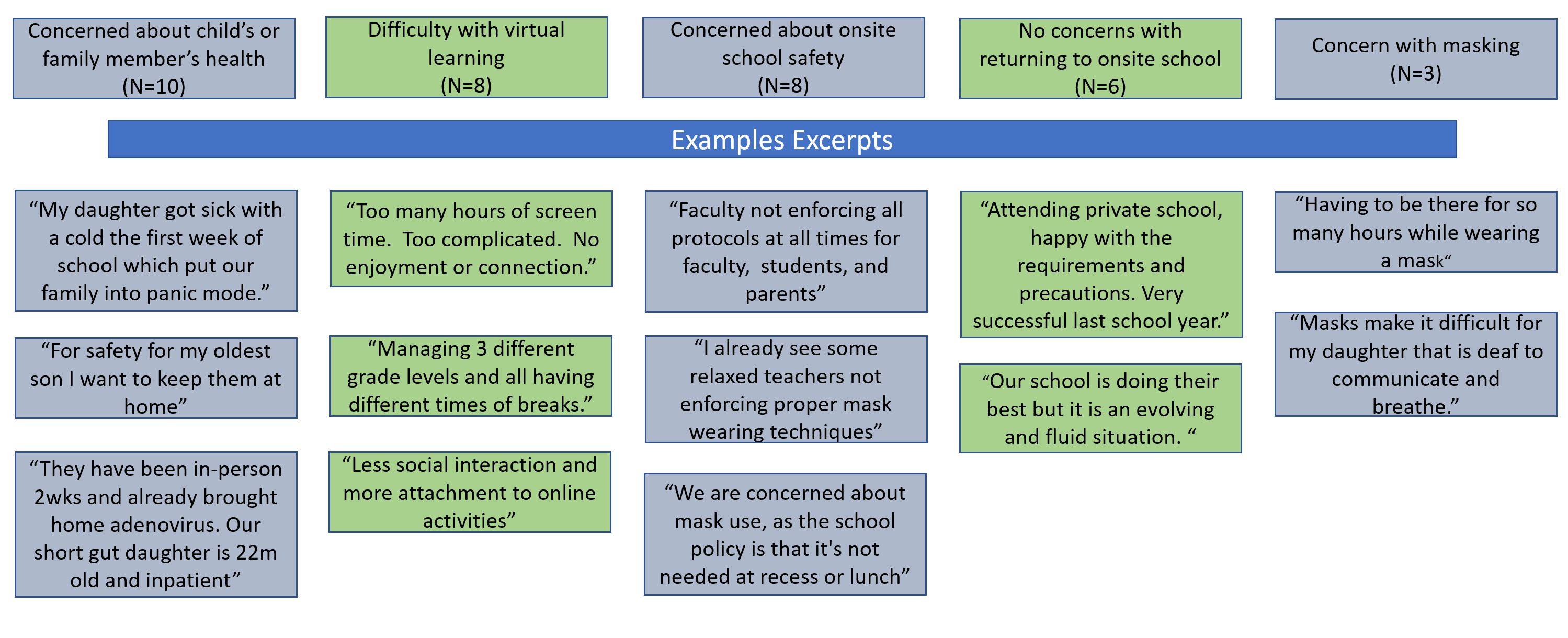General Pediatrics: All Areas
Category: Abstract Submission
General Pediatrics III
172 - Parents’ Perspectives on Return to School During the COVID-19 Pandemic
Sunday, April 24, 2022
3:30 PM - 6:00 PM US MT
Poster Number: 172
Publication Number: 172.316
Publication Number: 172.316
Madalin Berra, University of California, Irvine, School of Medicine, Long beach, CA, United States; Michael S. Kung, UC Irvine-CHOC, Cerritos, CA, United States; Kaidi He, Children's Hospital Los Angeles, Irvine, CA, United States; Behnoosh Afghani, UC Irvine, Orange, CA, United States

Michael S. Kung, MD
Resident
UC Irvine-CHOC
Cerritos, California, United States
Presenting Author(s)
Background: As the COVID-19 pandemic evolves, parents and schools continue to face challenges with both onsite and remote learning. There is a need to evaluate the parents’ specific concerns about their children’s educational, emotional and safety needs.
Objective: The objective of this study was to better understand the challenges faced by families in relation to their children’s education as the pandemic continues to evolve. We also examined the impact of different socioeconomic factors on parental attitudes about returning to school.
Design/Methods: We distributed an anonymous survey via QR code to parents of children seen in an academic medical center between September 2020 and October 2021. We asked about parental preference for their child’s return to school and underlying concerns, such as falling behind, preference for combination of in-person and remote learning, lack of ability to provide lunch at home, lack of internet resources, or lack of childcare. Parents also had an opportunity to share their perspective in an open-ended question. We analyzed the responses for common themes.
Results: Of 189 respondents, 149 (79%) reported that they have at least one school-age child. Of those, 65.7% preferred to send their child back to school, 13.4% would not send them back, and 20.8% were unsure. Desire to return to school was found to be associated with fear of the child falling behind in school (p < 0.001), preference for a combination of remote and in-person learning (P=0.06), and having a working parent (p=0.019). Concern for food insecurity was more likely to be chosen by parents with less than college education, minority parents and those with low income. Lack of technology resources was more likely to be chosen by those with less education, minority parents and those with low income (Table 1). In the qualitative part of our survey, 31 parents left comments (Figure 1). The most common themes among their comments included: concerns about the child’s or family’s health, concerns about onsite school safety, and difficulty with virtual learning. Conclusion(s): Parents continue to have concerns about their children’s schooling during the pandemic. Having food and technology resources were chosen more often by parents who identified as a minority, had low income or had less than college education. Qualitatively, the most common concerns related to health, safety, and difficulty with remote learning. Evidence-based interventions are needed to respond to concerns of parents and children, and to address the disproportionate impact of COVID-19 on families from low socioeconomic status and minority backgrounds.
Figure 1. Themes of Parental Opinions Regarding Their Child’s Return to School & Example Excerpts
Table 1. Association of Demographic Variables and Return to School Concerns from The Parent's Perspective.png)
Objective: The objective of this study was to better understand the challenges faced by families in relation to their children’s education as the pandemic continues to evolve. We also examined the impact of different socioeconomic factors on parental attitudes about returning to school.
Design/Methods: We distributed an anonymous survey via QR code to parents of children seen in an academic medical center between September 2020 and October 2021. We asked about parental preference for their child’s return to school and underlying concerns, such as falling behind, preference for combination of in-person and remote learning, lack of ability to provide lunch at home, lack of internet resources, or lack of childcare. Parents also had an opportunity to share their perspective in an open-ended question. We analyzed the responses for common themes.
Results: Of 189 respondents, 149 (79%) reported that they have at least one school-age child. Of those, 65.7% preferred to send their child back to school, 13.4% would not send them back, and 20.8% were unsure. Desire to return to school was found to be associated with fear of the child falling behind in school (p < 0.001), preference for a combination of remote and in-person learning (P=0.06), and having a working parent (p=0.019). Concern for food insecurity was more likely to be chosen by parents with less than college education, minority parents and those with low income. Lack of technology resources was more likely to be chosen by those with less education, minority parents and those with low income (Table 1). In the qualitative part of our survey, 31 parents left comments (Figure 1). The most common themes among their comments included: concerns about the child’s or family’s health, concerns about onsite school safety, and difficulty with virtual learning. Conclusion(s): Parents continue to have concerns about their children’s schooling during the pandemic. Having food and technology resources were chosen more often by parents who identified as a minority, had low income or had less than college education. Qualitatively, the most common concerns related to health, safety, and difficulty with remote learning. Evidence-based interventions are needed to respond to concerns of parents and children, and to address the disproportionate impact of COVID-19 on families from low socioeconomic status and minority backgrounds.
Figure 1. Themes of Parental Opinions Regarding Their Child’s Return to School & Example Excerpts

Table 1. Association of Demographic Variables and Return to School Concerns from The Parent's Perspective
.png)
